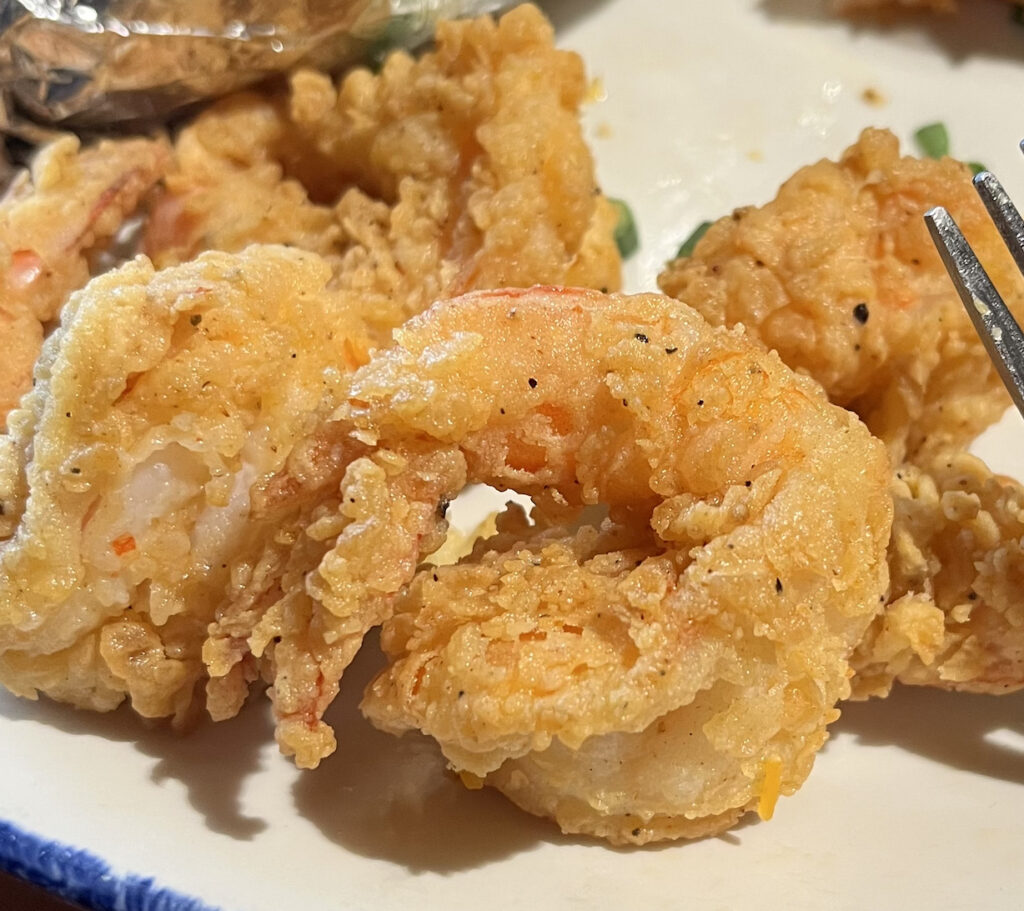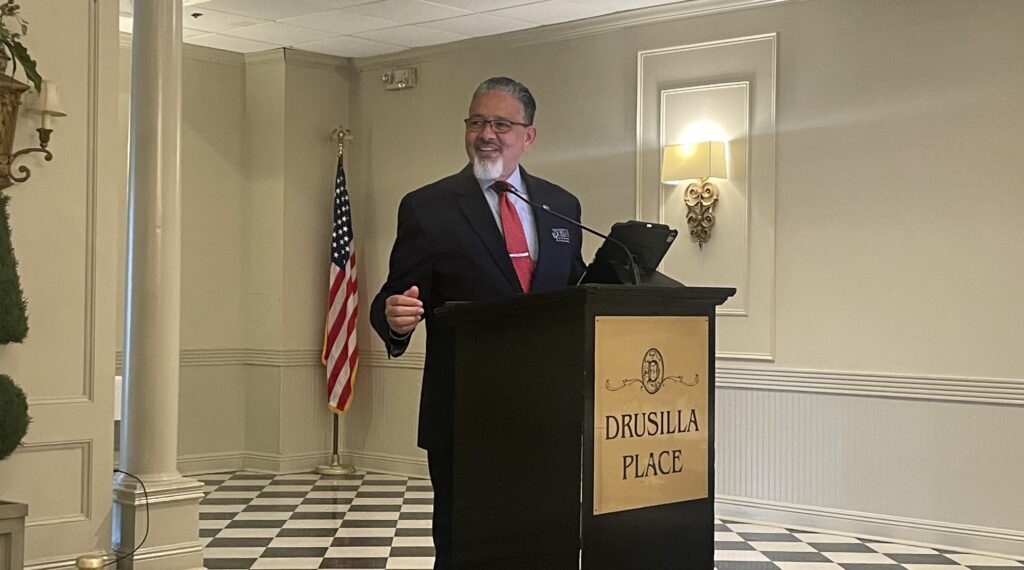News from the South - Louisiana News Feed
Seafood testers find Shreveport restaurants deceiving customers with foreign shrimp

by Wesley Muller, Louisiana Illuminator
March 26, 2025
Undercover seafood testers sampled a selection of restaurants in the Shreveport area this month and detected what they say is the highest shrimp fraud rate they have recorded to date in Louisiana.
SeaD Consulting, a food testing company that has been making headlines for uncovering seafood fraud at restaurants and festivals across the Gulf Coast, announced in a news release Wednesday that a “troubling” 58% of the restaurants sampled were deceptively serving foreign shrimp falsely presented as if it were domestic in violation of state law.
The company’s use of genetic testing found a total of 17 out of 24 restaurants sampled, or 71%, served foreign farm-raised shrimp. Fourteen of those, or 58%, did so deceptively by mislabeling the country of origin or refusing to indicate it on their menus or restaurant signage.
The sampling, taken March 8-10, is so far the highest inauthenticity rate the SeaD has recorded in Louisiana since it first launched its testing efforts last year at the Louisiana Shrimp & Petroleum Festival in Morgan City.
The company does not identify the restaurants that aren’t following the state’s labeling law, opting instead to raise awareness of its existence.
SeaD executive Erin Williams said six of the restaurants were “blatantly being deceptive” by explicitly mislabeling their dishes as “Gulf shrimp” rather than just falsely suggesting it.
It is illegal under federal and state law to mislabel imported seafood as local and can result in fines or other penalties. In some instances, seafood fraud offenses at the federal level can yield criminal charges or even prison time, such as in the 2024 convictions of two Mississippi restaurant owners, one of whom was sentenced to eight months in prison.
Local seafood was once easy to find in Louisiana, but an influx of cheap foreign catch, particularly shrimp and crawfish, has flooded the market over the past two decades.
Williams said she believes there is less public awareness in the Shreveport area of the foreign seafood problem and the plight of the coastal communities that depend on commercial fishermen.
In the past few years, state and federal authorities began cracking down on restaurants that mislead their customers into thinking the foreign seafood they’re eating is wild-caught from the Gulf of Mexico. Some establishments do this through vague dish descriptions or suggestive dining room decor such as nets or photos of shrimp boats on their walls — practices that the Federal Trade Commission announced could be illegal last year.
For more than a decade, Louisiana law has specifically required restaurants, eateries and other food establishments to state on their menus the country of origin of any shrimp and crawfish being served. The same requirements apply to food vendors at fairs and festivals.
There have been 2,600 violations of Louisiana’s imported shrimp law — and no fines
However, a 2023 review of state enforcement records revealed that many restaurants had not complied with the laws. Louisiana health inspectors issued thousands of citations to restaurants but levied no fines against them.
Some establishments have found creative ways around the laws by using vague menu descriptions, such as “Local shrimp served when available.”
In an effort to strengthen enforcement, state legislators recently enacted heavier fines for violators and updated Louisiana’s menu labeling statute. Still, a January meeting of the legislature’s Seafood Safety Task Force exposed some loopholes and contradictions in the new law, so it will likely undergo additional changes when lawmakers convene for their 2025 session beginning April 14.
SeaD Consulting launched its testing efforts last year using undercover inspectors to purchase shrimp dishes from vendors and restaurants. The inspectors run the shrimp through a rapid field testing kit that examines seafood tissue genetics in a process similar to the way medical professionals detect viral infections.
Dave Williams, a commercial fishery scientist and SeaD Consulting’s founder, developed the test in collaboration with Florida State University microbiologist Prashant Singh. Their process has been published and undergone peer review in a scientific journal.
In December, the Louisiana Shrimp Task Force, an advisory panel for the Louisiana Department of Wildlife and Fisheries, asked SeaD Consulting to analyze shrimp from restaurants across the state in an effort to eliminate consumer seafood fraud. Its analysis includes sampling batches of 24 randomly selected restaurants in different cities across the state.
“This is a blow to the culture of Louisiana, where authenticity in food is paramount,” Louisiana Shrimp Task Force Rodney Olander said in the press release. “When consumers are misled, it hurts local shrimpers and damages the reputation of our beloved seafood industry. We have the support of Southern Louisiana, but clearly not the entire state.”
In addition to its latest results out of Shreveport, the company’s testing of sampled eateries found a 30% shrimp fraud rate in Baton Rouge in December 2024, a 13% fraud rate in New Orleans in January, and a 33% fraud rate in Lafayette in February.
SeaD said it has furnished the names of all the restaurants found to be fraudulently serving imported shrimp to the Louisiana Department of Health for review and enforcement. The Health Department could not be immediately reached for comment Wednesday.
The seven restaurants in the sample found to be serving authentic Gulf of Mexico shrimp:
Chuck Wagon Crawfish, 1209 E. Bert Kouns Industrial Loop, Shreveport, LA 71105.Copeland’s of New Orleans, 1665 E. Bert Kouns Industrial Loop, Shreveport, LA 71105.The Crabby Crawfish, 8680 Youree Dr., Shreveport, LA 71115.Drago’s Seafood Restaurant, 777 Margaritaville Way, Bossier City, LA 71111.Flying Burger and Seafood, 3127 Airline Dr., Bossier City, LA 71109.The Noble Savage, 417 Texas St. Shreveport, LA 71106.Oyster Bar & Grille, 855 Pierremont Rd., Suite 157, Shreveport, LA 71106.
Louisiana Illuminator is part of States Newsroom, a nonprofit news network supported by grants and a coalition of donors as a 501c(3) public charity. Louisiana Illuminator maintains editorial independence. Contact Editor Greg LaRose for questions: info@lailluminator.com.
The post Seafood testers find Shreveport restaurants deceiving customers with foreign shrimp appeared first on lailluminator.com
News from the South - Louisiana News Feed
Easter Weekend: Muggy, warm, and windy

SUMMARY: Easter Weekend will be warm, muggy, and breezy, with mostly cloudy skies and temperatures in the low 80s. Current conditions are in the low 70s, making it a sticky day for events like the Crescent City Classic. While there’s a slight chance of rain on Sunday, most of the day will remain dry. Winds from the southeast could gust near 30 mph. Next week, a front will bring increased rain chances and storms starting Monday, with unsettled conditions continuing into Tuesday and Wednesday. Despite this, warm temperatures in the 80s will persist throughout the week.

Easter Weekend looks very nice! It will be hot, humid, and windy with high temperatures in the lower 80s both afternoons. More clouds will be around with some breaks
News from the South - Louisiana News Feed
Vicente Fernandez and Freddy Fender join National Recording Registry

SUMMARY: This year, Vicente Fernandez’s “El Rey” and Freddy Fender’s “Before the Next Teardrop Falls” were inducted into the National Recording Registry, alongside Lin-Manuel Miranda’s *Hamilton* album. Congressman Joaquin Castro has championed the inclusion of more Latino artists in the registry, noting that Latino representation is only 5%. Over the last three years, with input from constituents, Castro has successfully nominated 30 songs and albums, including iconic Latino tracks. He advocates for more Latino contributions to be recognized, including Selena’s work. Castro will continue gathering nominations for 2026, aiming to better reflect Latino cultural influence in the registry.

Each year since 2000, the Library of Congress has selected influential songs and albums to be preserved in the National Recording Registry. This year, three Latino artists were inducted — two of them with deep roots in Latino culture and South Texas.
News from the South - Louisiana News Feed
Q&A with University of Louisiana System President Rick Gallot on higher education

by Piper Hutchinson, Louisiana Illuminator
April 18, 2025
This is an interview with University of Louisiana System President Rick Gallot that took place earlier this month about how the legislative session and federal changes will impact higher education in Louisiana. It has been edited for length and clarity.
You can also listen to a version of this interview on our new podcast The Light Switch.
Piper Hutchinson: What do you think is coming for higher education this session?
Rick Gallot: I think certainly starting with a standstill budget is always better than starting with a proposed cut. So, you know, we’re certainly very grateful for that. I think there’s a lot of uncertainty, coming out of Washington and with the constitutional amendments that did not pass, obviously that has created some angst in terms of what do we do now, right? And so I think there is, again, just an overall level of uncertainty that we’ll see it … kind of play out over time.
I think if you look at the increased revenue from the sales, sales taxes and other things, we’re certainly not in a real bad spot right now as a state in terms of our finances. So I’m still optimistic that we will work through the challenges in the session, and we will come out good on the other side.
Hutchinson: Looking at the bills that we have so far, what do you think is going to be the most impactful for higher education?
Gallot: It’s hard to say, and when you look at what’s filed versus what ultimately makes it through the process; all bills filed on the front end don’t always make it. Rep. (Emily) Chenevert has come back with another diversity, equity and inclusion bill. We will certainly have to see how that plays out. The bill she had last year started one way and ended up another. … Certainly with all other higher ed leaders, she was very receptive to meeting with us and working through some of those challenges last year. At the end of the day, I think the budget is always going to be the main focus that could impact the trajectory going forward.
Hutchinson: There’s one bill that’s going to have a big impact for your system, talking about transferring UNO back to the LSU System. What should we expect on that front?
Gallot: For me personally, it’s a full-circle moment. I was in the house when UNO was transferred from LSU to the University of Louisiana System. You know, I just want what’s best for the students, for the campus community at the University of New Orleans. It is a legislative prerogative. They have the authority to transfer universities from one system to the other. So if this legislation is successful, we will certainly do our part to ensure that it is a seamless transition. We will work with LSU, with Board of Regents and with the legislature to ensure that the transition is as smooth as it could possibly be.
Hutchinson: What’s that like for you [as a former legislator] during the legislative session, being kind of outside the rails?
Gallot: Well, I certainly have a lot of respect for our legislators and the sacrifices they all make in serving. I’m a huge fan of Stephen Covey’s “Seven Habits,” and one of those is: “Seek, first to understand then to be understood.” And so I think that’s helpful to understand the pressures that our legislators are under, knowing that there’s a lot that they have to balance. I think it’s helpful, quite frankly. And I don’t think I burned any bridges while here.
I mean, I did oversee redistricting, so maybe I did [burn] one or two. But for the most part, I still have good relationships with many of my former colleagues … who are still there. I’m grateful to have the opportunity to be a part of the process but from this side.
Hutchinson: There has been a little bit of controversy in the LSU System lately, that’s reignited these conversations about curbing tenure. What are you hearing on that front, and what would that mean for higher education as a whole if they did take an axe to tenure?
Gallot: Going back to COVID, and you think about faculty members, who go through the process of, not only a bachelor’s and a master’s and a terminal degree. You know, they get hired, they’re on a tenure track, they’re researching, they’re writing, they’re building their portfolio, and at the appropriate time they apply for tenure. I think we have to respect that process.
I think it is one that is deeply rooted in higher education, and so I think we certainly have to respect faculty and that they have earned this.
Now, having said that, it’s always one or two bad apples that will spoil the barrel, as they say. I don’t know that simply doing away with tenure is the answer.
If the legislature passes something, then we, as a state system, will certainly abide by whatever changes may be made. I think we want accountability at all levels, that we want our students to be in the best position to learn. We want our faculty to be in the best position to teach, and that our students would graduate and go out and make a difference in society. So we’ll certainly be watching it closely, and hopefully we will see thoughtful debate throughout the process. And again, with whatever the ultimate result is, we will work with it.
Hutchinson: I can’t not talk about what’s going on at the federal level. We’re talking about cutting research funding. There are concerns about immigration and graduate students, and certainly tariffs could increase expenses for higher education. How is the UL System adapting to all of this?
Gallot: Right now there’s so much uncertainty just across the board. Whether it’s the potential loss of research funding and indirect cost, for instance, universities build their budgets based upon what they believe the revenue stream will be from these research grants. I’m hopeful that we will sort of get through this period of uncertainty, and we will see things sort of settle down to be a little more predictable. But you know, at the same time, we will have to adjust if the rules are changed. If the funding formulas are changed, we will just have to adapt. We always have and we always will.
GET THE MORNING HEADLINES.
YOU MAKE OUR WORK POSSIBLE.
Louisiana Illuminator is part of States Newsroom, a nonprofit news network supported by grants and a coalition of donors as a 501c(3) public charity. Louisiana Illuminator maintains editorial independence. Contact Editor Greg LaRose for questions: info@lailluminator.com.
The post Q&A with University of Louisiana System President Rick Gallot on higher education appeared first on lailluminator.com
-

 Mississippi Today6 days ago
Mississippi Today6 days agoLawmakers used to fail passing a budget over policy disagreement. This year, they failed over childish bickering.
-

 Mississippi Today6 days ago
Mississippi Today6 days agoOn this day in 1873, La. courthouse scene of racial carnage
-

 Local News6 days ago
Local News6 days agoSouthern Miss Professor Inducted into U.S. Hydrographer Hall of Fame
-

 News from the South - Alabama News Feed5 days ago
News from the South - Alabama News Feed5 days agoFoley man wins Race to the Finish as Kyle Larson gets first win of 2025 Xfinity Series at Bristol
-

 News from the South - Alabama News Feed5 days ago
News from the South - Alabama News Feed5 days agoFederal appeals court upholds ruling against Alabama panhandling laws
-

 News from the South - Florida News Feed7 days ago
News from the South - Florida News Feed7 days agoSevere weather has come and gone for Central Florida, but the rain went with it
-

 News from the South - Texas News Feed6 days ago
News from the South - Texas News Feed6 days ago1 dead after 7 people shot during large gathering at Crosby gas station, HCSO says
-

 News from the South - Florida News Feed6 days ago
News from the South - Florida News Feed6 days agoJacksonville University only school with 2 finalist teams in NASA’s 2025 Human Lander Challenge








































